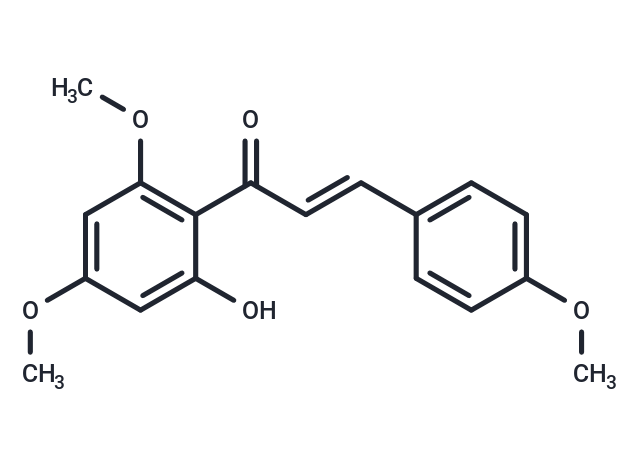Shopping Cart
- Remove All
 Your shopping cart is currently empty
Your shopping cart is currently empty

(E)-Flavokawain A, a novel chalcone from kava extract, induces apoptosis in bladder cancer cells by involvement of Bax protein-dependent and mitochondria-dependent apoptotic pathway and suppresses tumor growth in mice.

| Pack Size | Price | Availability | Quantity |
|---|---|---|---|
| 5 mg | $39 | In Stock | |
| 10 mg | $72 | In Stock | |
| 25 mg | $120 | In Stock | |
| 50 mg | $177 | In Stock |
| Description | (E)-Flavokawain A, a novel chalcone from kava extract, induces apoptosis in bladder cancer cells by involvement of Bax protein-dependent and mitochondria-dependent apoptotic pathway and suppresses tumor growth in mice. |
| In vitro | Flavokawain A significant inhibition on CYP1A2, CYP2D1, CYP2C6 and CYP3A2 activities with IC50 values of 102.23, 20.39, 69.95, 60.22μmol/L, respectively. The inhibition model was competitive, mixed-inhibition, uncompetitive, and noncompetitive for CYP1A2, CYP2D1, CYP2C6 and CYP3A2 enzymes. Molecular docking study indicated the ligand-binding conformation of Flavokawain A(P) in the active site of CYP450 isoforms. The chemical inhibition experiments showed that the metabolic clearance rate of Flavokawain A decreased to 19.84%, 50.38%, and 67.02% of the control in the presence of ketoconazole, sulfamethoxazde and a-naphthoflavone[1]. |
| In vivo | Flavokawain A results in a significant loss of mitochondrial membrane potential and release of cytochrome c into the cytosol in an invasive bladder cancer cell line T24. These effects of flavokawain A are accompanied by a time-dependent decrease in Bcl-x(L), a decrease in the association of Bcl-x(L) to Bax, and an increase in the active form of Bax protein. Using the primary mouse embryo fibroblasts Bax knockout and wild-type cells as well as a Bax inhibitor peptide derived from the Bax-binding domain of Ku70, Bax protein was, at least in part, required for the apoptotic effect of flavokawain A. In addition, flavokawain A down-regulates the expression of X-linked inhibitor of apoptosis and survivin. Because both X-linked inhibitor of apoptosis and survivin are main factors for apoptosis resistance and are overexpressed in bladder tumors, Suggest that flavokawain A may have a dual efficacy in induction of apoptosis preferentially in bladder tumors[2]. |
| Kinase Assay | Probe-based assays with rat liver microsome system were used to characterize the inhibitory effects of FLAVOKAVAIN A(P). Molecular docking study was performed to further explore the binding site of FLAVOKAVAIN A(P) on CYP450 isoforms. Chemical inhibition experiments using specific inhibitors (a-naphthoflavone, quinidine, sulfamethoxazde, ketoconazole, omeprazole) were performed to clarify the individual CYP450 isoform that are responsible for the metabolism of FLAVOKAVAIN A(P)[1]. |
| Animal Research | Flavokawain A was formulated in 10% grain alcohol in 0.9% saline and given by gavage. EJ bladder tumor cells were concentrated to 2 × 10^6 per 200 μL and injected s.c. into the right flank of each mouse. Next day, the mice were randomly divided and pair matched into treatment and control groups of 18 mice each, and daily dosing was begun with vehicle or 50 mg/kg flavokawain A. Because there were no in vivo data regarding flavokawain A before this study, the dose of flavokawain A (50 mg/kg/d) was used according to 1:60 of 3,000 mg/kg, a LD50 dose for a similar chemical structure compound, isoliquiritigenin . Body weight, diet, and water consumption were recorded thrice weekly throughout the study. Once xenografts started growing, their sizes were measured every other day. The tumor volume was calculated by the formula: 0.5236 L1(L2)^2, where L1 is the long axis and L2 is the short axis of the tumor. At the end of experiment, tumors were excised, weighed, blood collected, and stored at ?80°C until additional analysis[2]. |
| Alias | FLAVOKAVAIN A(P) |
| Molecular Weight | 314.33 |
| Formula | C18H18O5 |
| Cas No. | 37951-13-6 |
| Smiles | O(C)C1=C(C(/C=C/C2=CC=C(OC)C=C2)=O)C(O)=CC(OC)=C1 |
| Relative Density. | no data available |
| Storage | Powder: -20°C for 3 years | In solvent: -80°C for 1 year | Shipping with blue ice. | ||||||||||||||||||||
| Solubility Information | DMSO: 3.14 mg/mL (10 mM) | ||||||||||||||||||||
Solution Preparation Table | |||||||||||||||||||||
DMSO
| |||||||||||||||||||||

Copyright © 2015-2024 TargetMol Chemicals Inc. All Rights Reserved.